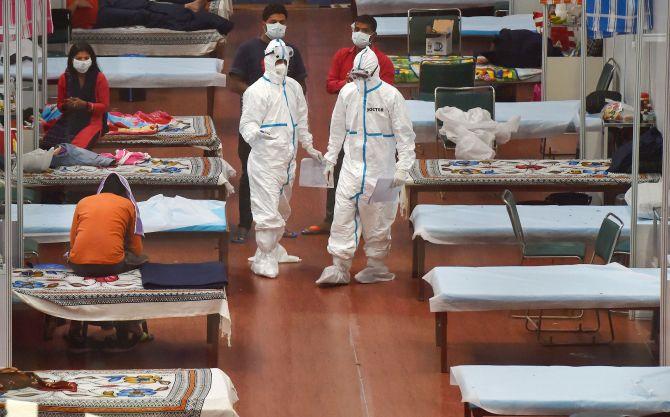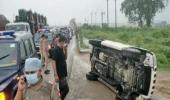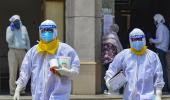Delhi's daily COVID-19 case count on Sunday remained below the 2,000-mark for the second consecutive day and with the recovery rate improving to nearly 80 per cent, authorities have for now put on hold plans to use stadiums as makeshift coronavirus care facilities.

In the last 24 hours, the national capital has recorded 1,573 fresh coronavirus cases, taking the tally to 1,12,494 in the city, while the death toll mounted to 3,371 after 37 fatalities were reported, according to the latest Delhi health department bulletin.
This is the first time in July that the daily case count has remained below the 2,000-mark for two consecutive days. On Saturday, 1,781 cases were detected.
The COVID-19 recovery rate improved to 79.97 per cent on Sunday, as per the bulletin.
Chief Minister Arvind Kejriwal said that Delhi has been able to minimise deaths of coronavirus patients in home isolation through pulse oximeters, which he termed as "suraksha kavach'' (protective shield).
The bulletin said as many as 89,968 patients have recovered, been discharged or migrated so far, while there are 19,155 active cases in the city.
The Delhi government has asked all district magistrates to document initiatives taken by them in their respective areas to deal with the COVID-19 situation.
For instance, the South Delhi district administration has set up a 10,000-bed Sardar Patel COVID Care Centre, one of the "largest" such facilities in the world, at the Radha Soami Satsang Beas.
Similarly, a 500-bed COVID care facility was set up at the Commonwealth Games Village in East Delhi. In North West district, railway coaches were converted into insolation wards for COVID-19 patients.
The DMs have been asked to also mention the difficulties they faced while executing such initiatives.
"The need was felt to showcase all such initiatives taken by the district magistrates so that their efforts are reflected in documents. All the DMs have been asked to make proper documentation of these initiatives introduced by them to deal with the COVID-19 situation," an official said.
Seeing the good recovery rate, authorities in the city have for now put on hold their plans to use stadiums as makeshift COVID-19 care facilities.
Last month, a Delhi government panel, constituted by Lt Governor Anil Baijal, had suggested to use Pragati Maidan, Talkatora Indoor Stadium, Indira Gandhi Indoor Stadium and JLN Stadium, Thyagaraj Indoor Stadium and Dhyanchand National Stadium for the purpose.
"Seeing the current situation, there is no need to convert stadiums into COVID-19 care facilities. We can use them (stadiums) for such facility, but it would be unnecessary step because many people are under home-isolation and recovering from the virus," an official in the east Delhi district administration said.
He said that if such need arises in the coming days, the district authorities will use stadiums as makeshift COVID-19 care facilities.
"We are closely monitoring the situation. As of now, there is no need to use any stadium for COVID-19 care facility," an official in the south district administration said.
On Saturday, a government study said that there has been a "sharp decline" in daily fatality figures in the past two weeks.
Terming pulse oximeters as "suraksha kavach", Kejriwal said these have helped minimise COVID-19 deaths of patients under home isolation in Delhi.
The Delhi government has provided pulse oximeters to asymptomatic and mild symptom coronavirus patients undergoing home isolation.
"Delhi has been able to minimise deaths of coronavirus patients in home isolation through this suraksha kavach called pulse oximeter. If patients detect their oxygen is falling they reach out to us for help. We immediately send oxygen concentrators to their home or take them to a hospital," Kejriwal said in a tweet.
A pulse oximeter is a device that measures blood oxygen level. Coronavirus patients need to be hospitalised if their oxygen level reaches 90 per cent or below, according to health guidelines.
A study of COVID-19 deaths reported in the last fortnight (from June 24), conducted by the Delhi government, has revealed that no one under home isolation has died in first week of July. The total number of daily deaths too have shown a sharp decline, the report said.
In a sign of revival of economic activities post the coronavirus-forced lockdown in Delhi, over 23,000 vehicles were registered in the city in June, up from just 8,455 a month ago, transport department officials said on Sunday.
Registration of cars and two-wheelers picked up after the restrictions due to the lockdown were relaxed, they said.
"The registration of vehicles picked up after 'Unlock 1' was declared, and total registrations were 23,940 in the month," said an official.
Official data shows that registrations in June included 18,741 two-wheelers (motorcycles and scooters) and 4,755 four-wheelers, he said.
Some restaurants reopened a month ago after being allowed to resume their business post the COVID-19 lockdown, but are still grappling with decreased sales, staff shortages and few dine-in customers.
Due to COVID-19 restrictions, many restaurants have not commenced dine-in facilities and are relying on takeaways to drive their business.
According to Rohit Aggarwal, director of Lite Bite Foods, post 'Unlock', the situation has not been "very motivating, walk-in numbers are extremely low and the operational cost is soaring".
"The highest number of dine-in guests we have served on a single day after opening following the COVID-19 lockdown is just 15 at Punjab Grill's Saket outlet. We are hoping to serve the same number of guests we had before very soon and are positive that this number will go up eventually.
"We are making just 20 per cent sales of what we used to do. Dine-in sales account for just 25 per cent of the existing 20 per cent sales and rest all are delivery and takeaway orders," he said.










